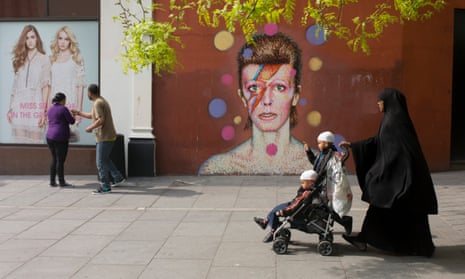The Conservative budget risks widening Britain’s racial divide by making millions of minority ethnic people poorer at a faster rate than their white counterparts, a study has found. Four million black and minority ethnic people could be left with less income, with one of the worst affected groups being British Muslims, according to the report by the Runnymede Trust.
The report was compiled by Omar Khan, the director of the trust, a racial equality thinktank. He said minority ethnic Britons were around twice as likely to lose out as white Britons from George Osborne’s plans. Runnymede’s study has built in the fact that the national minimum wage will rise to £9 a hour in 2020. But changes to tax credits and other welfare payments will hit minority ethnic Britons harder than their white compatriots.
Khan said: “Black and minority ethnic people are more likely to be disadvantaged by the budget. While ethnic minorities form around 11% of households and 14% of the UK population, we expect them to be over 15% of households and around 25% of individuals worst affected by the budget – because of their younger age, higher child poverty, lower wages, fewer pensioners and greater part-time working.”
Among ethnic minorities, more than 1.25 million households and more than 4 million people could be worse off, the study calculates, though the figure could be several hundred thousand higher and Runnymede adds that its calculations may underestimate the impact of the first Conservative budget in 18 years, which was unveiled nearly three weeks ago.
Runnymede wants the government to carry out a formal audit of the effect the budget will have on racial equality, called an equalities impact assessment. The Treasury did not respond when asked if it had carried out an equalities assessment of the 2015 budget.
The report says the budget will increase racial inequality inadvertently. It says: “The question isn’t whether government deliberately makes BME [black and minority ethnic] people worse off, but rather whether the effects of policies, directly or indirectly, increase racial inequality in reality.”
When it was unveiled, Osborne’s budget was seen as politically astute for wrongfooting Labour by announcing a minimum wage of £9 an hour for over-25s by the year 2020. But since then calculations of its effects have shown that the poor would lose out.
The Runnymede study finds that minority ethnic people will be hit by cuts to tax credits, new limits on child benefit and the lowering of the benefits cap.
For instance, people of Bangladeshi and Pakistani heritage in Britain are significantly poorer than other groups and five times more likely to have their income topped up by tax credits than white people.
Bangladeshi men are seven times more likely than white men to be working part time. More than one in three Bangladeshi men are in part-time work, compared with 9% for Indian men, 10% for black Caribbean men, 12% for black African and Chinese men, and 18% for Pakistani men.
Runnymede found that half of Bangladeshis – about 225,000 people – will lose out by £1,000 or more. Khan added: “We anticipate up to half of Bangladeshi and Pakistani households will be worse off – around 750,000 individuals in just under 200,000 households. The figure will be a bit lower proportionally for black African households, but no fewer than 300,000 individuals and 100,000 households will be negatively affected.”
The report warns that child poverty among minority ethnic groups may be even greater after the 2015 budget. It says: “Black and minority ethnic households are more likely to be living in poverty. This is particularly notable for BME children, with nearly 50% of Pakistani children and over 40% of Bangladeshi children living in poverty, and all BME groups having higher poverty rates than white British children.”
A Treasury spokesperson said: “This Budget set out a new contract with Britain, moving from a low wage, high tax, high welfare economy to a lower welfare, lower tax and higher wage economy. These changes mean that work will always pay more than a life on benefits, and the vast majority of working households will be better off once the changes have come into force in 2017. And all families are better off when you live in a country with the economic security that comes from living within its means.
“HMT has fully considered equality impacts on different protected groups.”

Comments (…)
Sign in or create your Guardian account to join the discussion